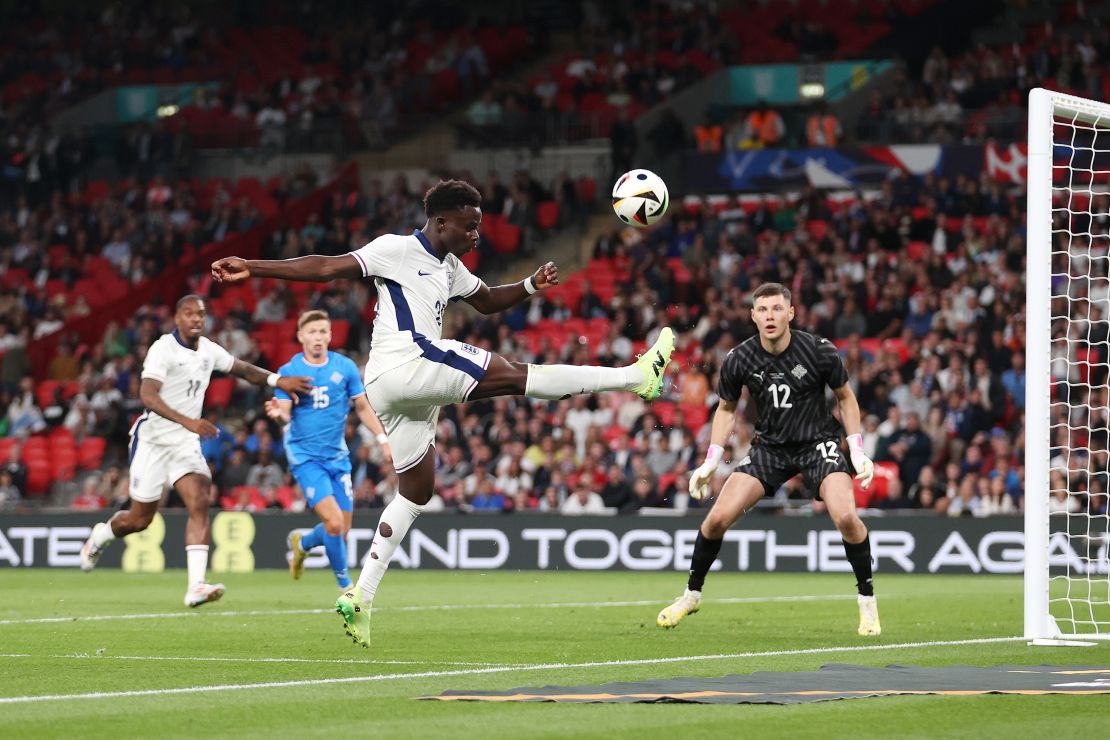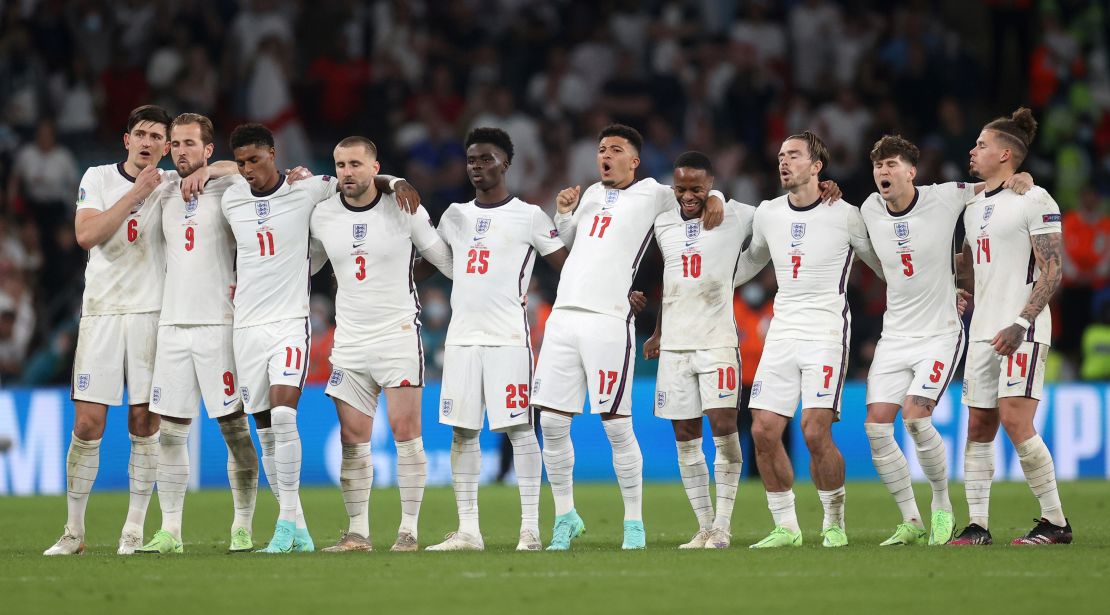Editor’s Note: Keith Magee is senior fellow and visiting professor in cultural justice at University College London Institute for Innovation and Public Purpose. He is chair and professor of practice in social justice at Newcastle University Law School and the author of “Prophetic Justice: Race, Religion, and Politics.” The views expressed in this commentary are his own. Read more opinion on CNN.
On Sunday, England will face Serbia in its first game of the Euro 2024 championship, hosted by Germany.?UK police?have assured members of the racially-diverse English squad any online racist abuse they receive during the tournament will be taken very seriously.

But there’s a crucial backstory from a few years ago.
After losing the final of Euro 2020 to Italy in a penalty shootout in July 2021, three of the English team’s Black stars — Marcus Rashford, Jadon Sancho, and Bukayo Saka — were targeted with a torrent of vile and racist abuse online.
Widespread outrage ensued. Several people who had posted hate-filled messages?were arrested?and there was a national outpouring of sympathy and support for the three young players.?Prince William, who is president of England’s Football Association (FA), said he felt “sickened” by what had happened.
Since then, the FA,?the European football association UEFA and?FIFA ,?the sport’s international governing body, have visibly upped their anti-racism game. They have launched strategies focused on preventing, rooting out and punishing racist abuse — not only on the pitch and in the stands, but on social media too.
Although appalling incidents have continued to mar the so-called beautiful game at home and?abroad, in light of?these high-profile efforts to combat discrimination, you might be forgiven for thinking, optimistically, that the tide was turning.
One might conclude, for instance, that Monday’s court decision in Spain meting out?prison sentences to three Valencia fans?for hurling racial insults, is evidence of European soccer’s new, tougher line against racism. The offenders in Spain, who were sentenced after chanting racial slurs at Real Madrid’s Vinícius Júnior last year, were given 8 months in prison and a two-year stadium ban.
All of this brings me back to Saka, the only footballer of the trio of victims of the post-Euro 2020 backlash to be included on this year’s team.

Saka might have reasonably expected that he would be able to get on the plane to Germany for Sunday’s match against Serbia confident that he would not be harassed again — or at least, not remotely to the same extent. Because everyone gets it by now, right? Officially, there is zero tolerance for racism in soccer. That means that Black and brown players across Europe should finally feel protected, even respected, no?
Saka knows UEFA observers will be on duty at every Euro 2024 match and will be on the lookout for racist incidents. The federation’s social media team will be scouring online platforms for abusive posts, lobbying to get them removed and reporting the posters to the police, who have promised to prosecute wherever possible.
But racism is making headlines again in the world of English soccer, reminding us of one of life’s most important lessons — never take progress for granted. And this time the alleged culprit is an entity that the sport’s oversight bodies seem to have overlooked in their anti-discrimination campaigns — the mainstream press.
Several days ago at Wembley Stadium, England lost 1-0 in a friendly, non-competitive match against Iceland, to the booing of disgusted home fans. Recently back from an injury, Saka was brought on as a substitute in the 65th minute of the match, well after the winning goal had been scored, and had little impact on the outcome.
Yet the next morning, it was Saka’s image that several mainstream media outlets selected to illustrate the loss, accompanied by sensational headlines, including one that read “Black Ice.”

Some critical observers?have pointed out?that in busy newsrooms journalists occasionally make thoughtless choices. I think this was more than that. I see it as an attempt by professionals who should know better to make a Black player carry the can for a disappointing performance by the whole team.
Ian Wright, a commentator and former player, immediately?called it out on X?, writing, “We can all see what’s happening & who’s being set up to be the face of defeat.” Sir Lewis Hamilton shared a?post from?Versus?on?his Instagram?account?that read: “We need to hold the English media accountable for systemically vilifying Black players … This endemic racial discrimination has no place in football, yet countless news outlets suggest otherwise.”
On Monday, Tony Burnett, CEO of the?anti-discrimination charity Kick It Out,?published an open letter?to the press, reminding them of the horrors of Euro 2020 and asking, “Has the media learned nothing?”
Burnett is right, of course.?No one in British media can claim they don’t realize how harmful?racial bias?can be. When you select an image of one Black player for the sports page of a major news outlet after the defeat of a national squad, you help set the tone for the whole country’s reaction.
You give permission to online trolls, soccer fans, and teenagers competing in the park to always blame the Black player if things go wrong in a match. And for some people — those who carry hate in their hearts — it’s not a huge leap from doing that to blaming Black people if things go wrong in the country. For instance, the ease with which various Conservative politicians recently whipped?up hatred by engaging in what many consider?racist dog-whistling?should give anyone with a public platform pause.
One would have to be extraordinarily na?ve to think systemic racism has been eradicated in the UK, and while recent?protests?and shocking?investigations?have certainly raised awareness and won new allies to the anti-racist cause, we must not become complacent. Soccer, like society, has a long, shameful history of dehumanizing people because of their race or ethnicity.
Get Our Free Weekly Newsletter
- Sign up for CNN Opinion’s newsletter
- Join us on Twitter and Facebook
While it’s crucial to point out the significant shortcomings by national and international organizations to rid the sport of all forms of discrimination, as?several key figures have done, we should support their efforts to rid the sport of all forms of discrimination. We should be grateful for the heroic work of anti-racism charities like?Show Racism the Red Card??and Kick It Out, which fight racism in soccer and beyond through campaigns and education programs.
But most of all, we should take personal responsibility for our own actions and never forget that racism is ready to rear its ugly head at the slightest provocation. It’s as important as ever to be mindful about what we say, what we post and share online, and which pictures we choose to publish.
I hope the England team will storm to victory in Euro 2024. If they don’t, I hope no single player of any skin color will be turned into a scapegoat and expected to bear the burden of an entire nation’s disappointment. After all, soccer is just a game. But the better elements of the sport are trying to make a stand against hate, and every one of us needs to get onside with that.
Editor’s Note: CNN contacted The Daily Sun, The Telegraph and the Daily Star about the controversy over publishing images of Saka in the aftermath of England’s loss to Iceland, but received no response at the time this article was published. The BBC, in its reporting addressing the move to use Saka’s image, quoted one of its spokespeople who said the decision to “was not intended to highlight his performance specifically” and said that his one was one of a number of player images used. “It is of course important that we are considerate and take care around the images we use,” the spokesperson added.


